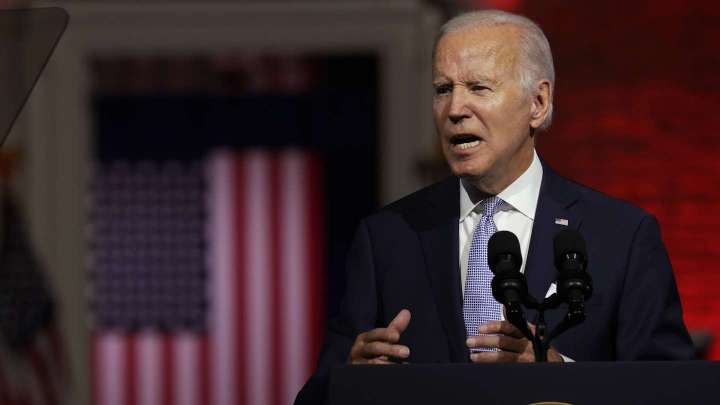Recent political history teaches that attacking your opponents’ base of support while wielding too broad a brush can be counterproductive.
When Biden targets ‘MAGA Republicans,’ exactly whom is he talking about?

Republicans then turned the tables in 2016 with Hillary Clinton and her “deplorables” commentary about Trump supporters, making the coinage something of a badge of honor during Trump’s presidency.
So it’s no surprise Republicans are claiming President Biden’s ramped-up attacks on “MAGA Republicans” involve a similarly broad brush: They’re seeking to rally Republicans behind the idea that Biden is impugning many or even all of them.
The reality isn’t so cut and dried.
A closer look at Biden’s commentary shows he hasn’t affixed as large a number to those he’s targeting as Romney or Clinton did. And as Republicans have tried to expand the universe of people implicated in the label, Biden and the White House have taken care to emphasize they’ve restricted it.
When Biden linked the “MAGA philosophy” to “semi-fascism” last week, Fox News and Republicans claimed to be aghast and assured he was talking about “you,” even as Donald Trump had lodged a similar attack on portions of the left without inspiring such apoplexy. When White House press secretary Karine Jean-Pierre detailed the case against “MAGA Republicans” this week, viral tweets and other commentary cast the remarks as talking about those who “voted for Trump” and “Trump voters.” After Biden’s speech Thursday night warning of MAGA Republicans’ threat to democracy, Sen. Marco Rubio (R-Fla.) declared, “Angry man smears half of the people of the country he is supposed to lead.” Before the speech, House Minority Leader Kevin McCarthy (R-Calif.) said Biden was “slandering tens of millions of Americans as fascists.”
But in the speech, Biden emphasized this wasn’t about all or even most Republicans.
“I want to be very clear up front,” Biden said. “Not every Republican — not even a majority of Republicans — are MAGA Republicans. Not every Republican embraces their extreme ideology.”
He added: “There are far more Americans — far more Americans — from every background and belief, that reject the extreme MAGA ideology than those that accept it.”
Jean-Pierre previewed the speech Wednesday by saying that “the way that he sees it is the MAGA Republicans are the most energized part of the Republican Party.” She focused on “the MAGA Republicans in Congress” and “the MAGA Republicans in leadership.” “They’re the ones who have the platform,” she added.
Despite the claims that she was referring to Trump voters writ large, she didn’t use the word “voter.” And in fact, she said explicitly that she “can’t talk about voters from here, as you know.” (“Here” meaning the White House podium.)
The White House clearly wanted to emphasize this wasn’t about all Republicans. And sometimes such comments get walked back. But nor do Biden’s earlier comments indicate he was talking about all or even necessarily most Republicans.
In his comments about “semi-fascism” on Aug. 25, he called on “mainstream Republicans” to join in rejecting that philosophy. He added: “The data shows that a significant portion of Republican Party agrees with us. They agree with the fact that the MAGA crowd has gone much too far — much too far in their view of what the role of government is.”
So from the start, Biden has distanced “MAGA” from a “significant portion” of the Republican Party. And he’s now clarifying that he’s not even talking about half of Republicans.
Romney’s 47 percent line, by contrast, was literally defined by the number he attached to it — a very large number — which is what arguably made it so potent. And Clinton in her “deplorables” comment also instantly attached a fraction to it.
“You know, to just be grossly generalistic, you could put half of Trump’s supporters into what I call the ‘basket of deplorables.’ Right?” Clinton said. “The racist, sexist, homophobic, xenophobic, Islamophobic — you name it.”
Clinton quickly recognized her error, expressing regret for using such a “grossly generalistic” percentage.
Biden has been less specific about just how many people he believes to be “MAGA Republicans” who are a threat to democracy, for obvious reasons. And his opponents have sought to expand the universe of people he’s supposedly talking about, for obvious reasons. (Biden did add, “There’s no question the Republican Party is dominated, driven and intimidated by Trump and the MAGA Republicans — and that is a threat to this country.” But he assured that a minority of the party was driving this.)
That’s the risk of going down this path. As Philip Bump writes, Trump has successfully weaponized the idea that his supporters are persecuted and marginalized by the elites running this country. Biden feels that this movement is so dangerous that it must be called out and reckoned with — and, possibly, that there are political benefits to driving a wedge between more moderate voters and the extreme wing of the GOP. But lots of Republicans clearly still support Trump, and the vast majority of them falsely believe the 2020 election was stolen.
It’s certainly a calculated risk, especially given Democrats’ fortunes in the midterms already appeared to be improving. On the one hand, keeping the focus on Trump seems to have paid dividends. On the other, even moderate voters who cast ballots for Trump might feel attacked because they picked a side in the voting booth, twice — even if Biden has repeatedly and explicitly sought to carve them out of the group he’s talking about.






